Hugo
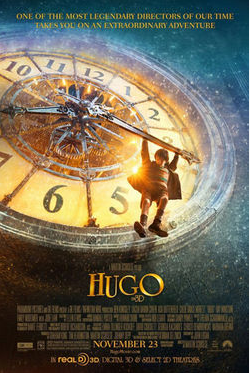
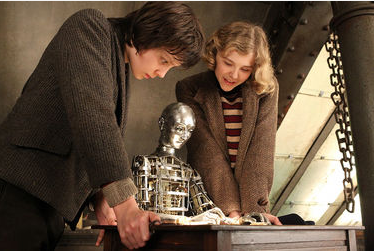 Young Hugo (Asa Butterfield) is a boy who lives alone within the walls of a massive train station in Paris in the 1930s. His main skill is keeping the clocks within the station running, something that was taught to him by the alcoholic uncle who has been taking care of him since his father, a clockmaker, died in a tragic fire accident. We witness in flashbacks (where Hugo's father is played by Jude Law) that of all the gadgets and clockwork items his father kept, his favorite and most mysterious was a mechanical man known as an automaton that he rescued from the attic of a museum that was just going to throw it away. Hugo's father spent years trying to repair the thing and get to work, but died before he could finish. Hugo now carries on his father's work, wanting to get the automaton running again in his spare time. Since Hugo lives alone (the uncle who he was placed in the care of has mysteriously gone missing) and is too young to hold a job, he steals what he needs from the different booths and shops placed around the train station, whether it be food, or gears and clockwork pieces that he needs for the automaton.
Young Hugo (Asa Butterfield) is a boy who lives alone within the walls of a massive train station in Paris in the 1930s. His main skill is keeping the clocks within the station running, something that was taught to him by the alcoholic uncle who has been taking care of him since his father, a clockmaker, died in a tragic fire accident. We witness in flashbacks (where Hugo's father is played by Jude Law) that of all the gadgets and clockwork items his father kept, his favorite and most mysterious was a mechanical man known as an automaton that he rescued from the attic of a museum that was just going to throw it away. Hugo's father spent years trying to repair the thing and get to work, but died before he could finish. Hugo now carries on his father's work, wanting to get the automaton running again in his spare time. Since Hugo lives alone (the uncle who he was placed in the care of has mysteriously gone missing) and is too young to hold a job, he steals what he needs from the different booths and shops placed around the train station, whether it be food, or gears and clockwork pieces that he needs for the automaton.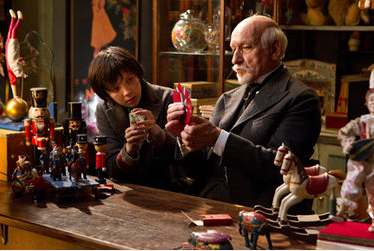 He gets those parts from a small toy shop that specializes in wind up toys, which is managed and run by the grumpy Georges Melies (Ben Kingsley). If the name sounds familiar to film fans and historians (as it should), that's because the character is indeed supposed to be the legendary filmmaker from the early 20th Century, best known for the 1902 silent classic, A Trip to the Moon. Georges has fallen on hard times since his heyday, and doesn't like to think about the past. When he catches Hugo trying to steal something, and discovers the boy's notebook containing his dad's notes and drawings about the automaton, it instantly triggers painful memories within him. He won't say how or why, however, and takes the prized notebook, threatening to burn it when he gets home. Hugo's only ally in getting the notebook back and in uncovering the connection between the lonely old man and his father's mechanical man is Georges' goddaughter, Isabelle (Chloe Moretz). They will have to search the past, as well as the past of cinema itself, to uncover the answers, all the while avoiding the Station Inspector (Sacha Baron Cohen), who wants to capture Hugo and send him away to an orphanage.
He gets those parts from a small toy shop that specializes in wind up toys, which is managed and run by the grumpy Georges Melies (Ben Kingsley). If the name sounds familiar to film fans and historians (as it should), that's because the character is indeed supposed to be the legendary filmmaker from the early 20th Century, best known for the 1902 silent classic, A Trip to the Moon. Georges has fallen on hard times since his heyday, and doesn't like to think about the past. When he catches Hugo trying to steal something, and discovers the boy's notebook containing his dad's notes and drawings about the automaton, it instantly triggers painful memories within him. He won't say how or why, however, and takes the prized notebook, threatening to burn it when he gets home. Hugo's only ally in getting the notebook back and in uncovering the connection between the lonely old man and his father's mechanical man is Georges' goddaughter, Isabelle (Chloe Moretz). They will have to search the past, as well as the past of cinema itself, to uncover the answers, all the while avoiding the Station Inspector (Sacha Baron Cohen), who wants to capture Hugo and send him away to an orphanage.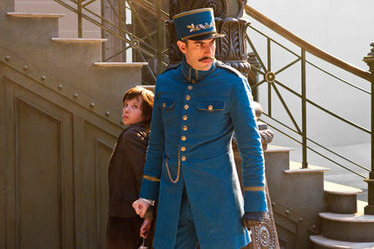 As expected from Scorsese, Hugo is a true visual triumph, from the set design of the train station itself (both the main passenger and consumer areas, and the secret back areas and clock towers that Hugo calls home), right down to the dream-like vision of the streets of Paris that Hugo watches from his window. The train station itself kind of becomes its own world, which makes sense for a boy who lives there in secret, and knows the ins and outs of the entire place. That's why the arrival of young Isabelle is so important. She is the first friend Hugo has had since his father died, and she introduces him to books with the aid of a kindly old bookseller (Christopher Lee), while he introduces her to the world of film. In fact, it's when the young heroes start digging into the past of cinema, looking for answers, that the movie truly reveals itself for what it is - a cinematic love letter to the "magicians" (in Georges case, quite literally) who saw early film as a tool for grand storytelling and visual effects.
As expected from Scorsese, Hugo is a true visual triumph, from the set design of the train station itself (both the main passenger and consumer areas, and the secret back areas and clock towers that Hugo calls home), right down to the dream-like vision of the streets of Paris that Hugo watches from his window. The train station itself kind of becomes its own world, which makes sense for a boy who lives there in secret, and knows the ins and outs of the entire place. That's why the arrival of young Isabelle is so important. She is the first friend Hugo has had since his father died, and she introduces him to books with the aid of a kindly old bookseller (Christopher Lee), while he introduces her to the world of film. In fact, it's when the young heroes start digging into the past of cinema, looking for answers, that the movie truly reveals itself for what it is - a cinematic love letter to the "magicians" (in Georges case, quite literally) who saw early film as a tool for grand storytelling and visual effects.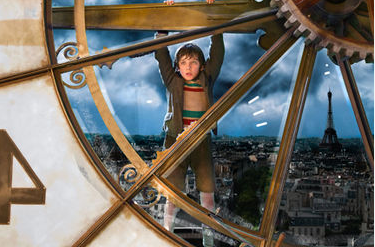 This is Scorsese's thank you to the pioneers of the film medium. Filmmakers like Georges Melies were the first to create new worlds on the screen people hadn't seen before, and this movie serves not only as a history lesson of those pioneers, but also as a lesson for current filmmakers. The imagery, the art direction, the design of the mechanical sets with the various cogs, wheels, coils, and springs clanking all about young Hugo as he runs through the inside of a massive clock, the feather-like snow that falls on the streets of Paris, as well as the use of CG effects is a textbook example on how to make a truly remarkable looking film, but have it not be so overpowering that we lose the story being told. The screenplay by John Logan (Rango) tells a simple story that is filled with memorable characters and performances. There's hardly a misstep to be found in terms of casting (especially young actors Butterfield and Moretz, along with Ben Kingsley delivering one of his better performances in a while) or in the handling of the characters they play.
This is Scorsese's thank you to the pioneers of the film medium. Filmmakers like Georges Melies were the first to create new worlds on the screen people hadn't seen before, and this movie serves not only as a history lesson of those pioneers, but also as a lesson for current filmmakers. The imagery, the art direction, the design of the mechanical sets with the various cogs, wheels, coils, and springs clanking all about young Hugo as he runs through the inside of a massive clock, the feather-like snow that falls on the streets of Paris, as well as the use of CG effects is a textbook example on how to make a truly remarkable looking film, but have it not be so overpowering that we lose the story being told. The screenplay by John Logan (Rango) tells a simple story that is filled with memorable characters and performances. There's hardly a misstep to be found in terms of casting (especially young actors Butterfield and Moretz, along with Ben Kingsley delivering one of his better performances in a while) or in the handling of the characters they play.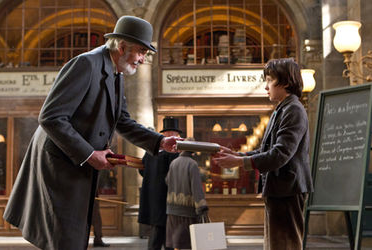 All that said, I do somewhat question the studio's decision to market this film as a whimsical kids' movie. Not that I think it's misleading, as there are certainly moments of whimsy to be found, and there's nothing offensive here for kids. It simply seems like a disservice to what the film really is. In fact, small children will most likely be bored by the film's somewhat leisurely pace, talky nature, and a running time that goes just over two hours. Older children and their parents (especially those with a love of film history) will no doubt be enthralled. But for younger children, there are better options more suited for them, such as the equally wonderful The Muppets or Arthur Christmas. Hugo is indeed a special film, and one which I'm surprised even got made. It's scope and scale are quite grand and epic, but the story itself is very personal and nostalgic. Despite the PG-rating, and the fact that it's being marketed as a holiday fantasy for the whole family, I definitely think adults will get the most out of this film.
All that said, I do somewhat question the studio's decision to market this film as a whimsical kids' movie. Not that I think it's misleading, as there are certainly moments of whimsy to be found, and there's nothing offensive here for kids. It simply seems like a disservice to what the film really is. In fact, small children will most likely be bored by the film's somewhat leisurely pace, talky nature, and a running time that goes just over two hours. Older children and their parents (especially those with a love of film history) will no doubt be enthralled. But for younger children, there are better options more suited for them, such as the equally wonderful The Muppets or Arthur Christmas. Hugo is indeed a special film, and one which I'm surprised even got made. It's scope and scale are quite grand and epic, but the story itself is very personal and nostalgic. Despite the PG-rating, and the fact that it's being marketed as a holiday fantasy for the whole family, I definitely think adults will get the most out of this film.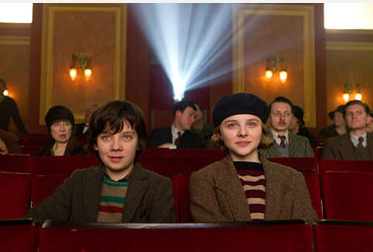
See the movie times in your area or buy the DVD at Amazon.com!






0 Comments:
Post a Comment
<< Home